The 'Outstanding Woman in Business' awardees over the years
In this category, we highlighted outstanding women leaders in our corporate world who broke into, what was mainly men's domain, and established themselves as "women entrepreneurs" of merit, vision, courage, and reliability.
Through their exceptional work they were able to change the perception of women and their image and gradually establish their credentials in the business world.
Along with men, The Daily Star, in partnership with DHL, have also been honouring these women leaders through our Business Award as "Outstanding Woman in Business" since 2000.
Here we present them together – in reverse order – with the hope that this special supplement will encourage more women to enter the world of business and break the "glass ceiling" that has held back our women over the years.
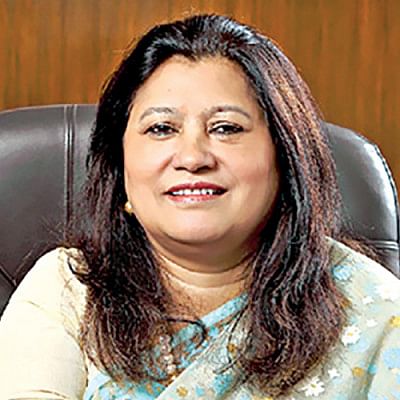
Rupali Chowdhury - 2020
If women want their voices to be heard and supersede all the impediments that come their way, they have to be confident enough to express themselves articulately.
Confidence grows only in those who continuously learn new skills, sharpen their existing ones, and stay well-aware of the innovations and changes that are happening not only within the country but also across the globe.
Now, anything a woman aspires to learn is available at her fingertips. Alongside reading materials on management and other relevant subjects, browsing online articles, blogs, and social media content are indispensable tools for a woman to stay ahead of the competition.
This is what Rupali Chowdhury, managing director of Berger Paints Bangladesh, believes a woman needs to become successful.
She credited her successful career to the strong foundation she built during her childhood.
"I was raised in a small town in Chattogram called Patiya. In the post-liberation period, a renaissance was going on in Bangladesh, and I also felt its effect," she said.
Chowdhury focused on extra-curricular activities while growing up.
"That period of my life taught me how to break the shackles and prejudices. My extremely supportive mother, Shalinata Chowdhury, also encouraged me to explore my true potential."
Rupali Chowdhury strongly believes people who remain engrossed with cultural and other extra-curricular activities in their childhood eventually excel in life.
"At our home, we had access to an eclectic collection of books. We actually inherited the habit of reading different types of books from our father, the late Priyadarshan Chowdhury, who was a doctor by profession, was an avid reader and subscribed to foreign magazines, including Newsweek, Times, Readers' Digest and Desh."
"The cultural activities I was involved in helped me know new people, constantly grow, become compassionate, and hone my interpersonal skills."
After completing honours in chemistry from Chattogram University, Chowdhury did her MBA from the Institute of Business Administration under Dhaka University.
"My brother Shyamal Bikash Chowdhury and my husband Abdul Haque inspired me to complete the MBA programme. I believe that was a turning point in my career. That MBA programme really helped me learn how to be successful in the business world."
She started her career with a Swiss multinational pharmaceutical and chemical company called Ciba Geigy (Bangladesh) in 1984. She moved to the port city after marriage and joined Berger Paints in 1990 as a planning manager.
She worked in various departments of the multinational company, including marketing, sales, distribution, planning and systems in different supervisory capacities, which made her one of the finest leaders not only in the paint industry but also all other sectors in the country.
The entry to the corporate world was not smooth, she said.
"Once you start working, people will only see how well you can deal with critical situations. Gender doesn't get that much focus then."
She became the director for operations of Berger Paints in 2004 and managing director in 2008.
Chowdhury served the Foreign Investors' Chamber of Commerce and Industry as president for two terms (2013-2015 and 2015-2017) and was elected again for the 2019-21 term.
Berger reached several milestones under her leadership, including the formation of two international joint ventures – Berger Becker Bangladesh in 2012 and Berger Fosroc in 2018.
During her tenure, Berger has diversified to a number of business segments, including adhesives, textile emulsions, and printing ink, brought new technologies to the industry and launched environment-friendly, lead-free, and odourless paints.
She considers people management skills along with functional expertise as the fundamentals of her leadership strengths.
"I wanted to lead Berger by building an organisational structure based on meritocracy."
Chowdhury said her parents, siblings, husband, and in-laws had played a vital role in her path to glory.
"Credit also goes to my colleagues and stakeholders in the companies for their splendid support. I want to express my gratitude to our former managing director Masih-Ul-Karim and our former regional director KR Das."
She said she is also indebted to the company's board of directors and majority shareholders, who gave her the opportunity to work in different capacities.
"I prefer women to be self-dependent first before getting married," said Chowdhury, also the chairman and managing director of Jenson & Nicholson (Bangladesh), a subsidiary of Berger Paints Bangladesh.
What surprises Chowdhury the most is the absence of women in the top positions in the financial sector.
Many women are now working in the top posts in multinational companies, but heartbreakingly, many of them might have to give up the job for family reasons just before taking the leadership roles, she said.
For a successful company, the leaders should believe in putting the right person in the right place, said the philanthropist, who is also an independent director of Bata Shoe Company (Bangladesh) and Linde Bangladesh.
The seasoned corporate leader said she now wants to give back to society by working with the regulatory bodies and global entities to increase foreign investment in Bangladesh.
As the number one company in the paint industry, Berger Paints Bangladesh has been consistently trying to diversify its product range, she said.
2020 had been a tough period for Berger Paints Bangladesh due to the Covid-19 outbreak.
The deadly coronavirus slashed the company's sales by almost 50 percent in the April-June quarter to Tk 228.5 crore from the previous quarter.
Chowdhury emerged as a great leader and led the company to provide its painters with over Tk 1.75 crore to help them recover fast from the fallouts of the pandemic.
She also made it possible for Berger Paints Bangladesh to achieve 81 percent of last year's sales in the April-September period of 2020.
Chowdhury thanked The Daily Star and DHL Express Bangladesh for selecting her for the Outstanding Woman in Business award.
"Any recognition is a matter of great joy. I am delighted to receive the award. I believe that the award will encourage other women to do better in life," she said.
"But I don't consider myself as a finished product. I consider myself a work in progress. This award is going to inspire me to move further beyond, inspire Bangladeshi people and create jobs."
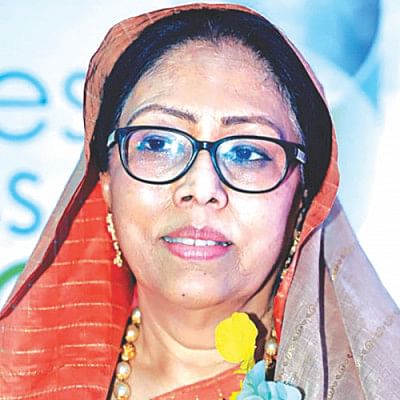
Qamrun Nahar Zahir - 2019
Visionary entrepreneur Qamrun Nahar Zahir has led Ananta Group from the front to help its annual turnover to cross USD 300 million.
Under her leadership, the group's export increased by nearly 100 times since 1993 when she took charge of the conglomerate after the sudden death of her husband and founder Humayun Zahir.
However, the early years were not smooth for Qamrun Nahar.
It was a tough task for her after the passing of her husband to decide whether to take care of the budding business or focus only on the family of four school-going minors.
"It was a nightmare for me. I was senseless for a few days after the unusual death of my husband," said Nahar who was only 41 then.
But the strong-willed Qamrun Nahar managed both the family and the business and achieved immense success.
Humayun Zahir had a small garment factory with only 500 workers and a few machineries on Elephant Road in Dhaka.
From only a few millions of exports in 1993, Ananta now employs 28,000 people across its global footprint and has an annual turnover exceeding USD 300 million.
Qamrun Nahar hopes her group will be able to export USD 305 million worth of apparel items now as it has been doing business with renowned international retailers and brands.
The company has the privilege of working with over 20 global giants, including H&M, GAP, NEXT, Jack & Jones, Levi's, Zara, Marks & Spencer, and Primark.
Qamrun Nahar completed her BSc in biochemistry from University of Karachi in Pakistan and her MSc on the same subject from Dhaka University.
She had been a teacher in Dhaka Women's College, which was in fact established by her husband and by herself at Dhanmondi in Dhaka.
Along with her teaching profession, Qamrun Nahar started garment business with a few work orders at a small factory in Dhaka's Elephant Road and made a little profit.
By this time, she sent her children abroad for higher studies and she continued her business with the help of her father and brothers.
In 1998, the moment came for Qamrun Nahar when she bought an old garment factory in Ashulia, which later changed everything in her life.
"Buying the old factory and making it functional was a turning point of my life."
The former owner of the old factory was failing to pay some 1,600 workers as he had little work orders.
Qamrun Nahar renovated the production unit and the US retailer GAP started placing work orders.
"I didn't need to look back as I had a handful of work orders and the factory was running well," she said.
In 2000, Sharif Zahir, now managing director of Ananta Group, joined her mother Qamrun Nahar to take the group to its current position.
Now, Ananta Group has eight state-of-the-art garment factories.
Qamrun Nahar, also the chairman of Ananta Properties and Ananta Energy Resources, has a plan to set up a model town on Madani Avenue on 13 acres of land in Dhaka.
Work of the Tk 2,500 crore mega real estate project will come to an end in the next seven years. Nine towers will be built which will be up for sale.
The chairman of the group has a plan to employ 3,000 people in different units every year till 2025, by which the company targets to export USD 1 billion worth of garment items.
The company has already purchased 150 acres of land in Mirsarai to build another industrial village at a cost of USD 450 million to produce diversified garment items like sportswear, lingerie, and knitwear. The construction work of the village will start by December next year.
She also has a plan to go for a joint venture with Chinese or Sri Lankan companies for the operation of the Mirsarai project.
Qamrun Nahar has the plan to make two of her garment companies public by next year. She will float initial public offering of Ananta Denim and Ananta Apparels at the end of this year.
She has already signed agreement with global hotel chain management Marriott to operate a five-star hotel also on Madani Avenue.
She also aims to open a mixed-use type five-star hotel by 2025 at a cost of USD 250 million.
Her youngest child Asif Zahir, now a director of the group, joined the company after completing his studies from Harvard University and Stanford University.
Two of her daughters are staying abroad. One of them has been practising gynaecology in London and another one has been employed in a multinational company in the US as a consultant.
Social activist Qamrun Nahar is also a director of Janata Insurance and a former vice-chairman of the United Commercial Bank.
The first vice district governor of Lions Club, Dhaka and a life member of Gulshan Society, Qamrun Nahar also loves reading, travelling, and sports. She was born in Noakhali in 1952.
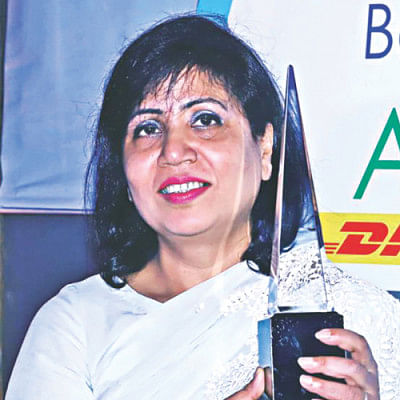
Afsana Asif Shoma - 2017
Designing saris with her mother was a childhood passion for Afsana Asif Shoma. That knack for creativity along with perseverance helped her to become one of the most successful jute goods producers in the country.
Shoma's company – Asix – now generates some USD 1.5 million in exports every year. But the journey was not all plain sailing.
Shoma used to manage her own pocket money by decorating clothing for people around her and offering in-home tutoring for students while studying finance at Dhaka University.
With some savings and mortgaging a pair of gold earrings at an Old Dhaka shop, she made her entrepreneurial debut by opening a boutique shop with a neighbouring aunt.
But she had to start anew after getting married in 1994 and shift to Chattogram with her husband. She opened a workshop in Pahartali to make women's clothing and paint saris.
Shoma named her brand – Dalsanea – after a beautiful woman she had read about in school.
At one point, her husband was transferred to Pakistan. But the determined entrepreneur decided to stay put.
She started teaching at Sunshine Grammar School and took a loan of Tk 25 lakh from the Micro Industries Development Assistance and Services (MIDAS) in 2000 to expand her business.
Another hiccup came in the form of a surgery which her 26-day-old newborn had to go through. She then put the business on hold and gave undivided attention to the child's recovery.
Shoma's worries eventually came to an end and she focused on running the business in full swing in Dhaka.
Thanks to her husband's posting she started travelling to India and Pakistan to collect decorative materials such as stones and beads.
Soon Shoma found that similar clothing concepts were circling the subcontinent because of the similarities in cultures.
She then tried her luck by exhibiting some jute goods in Pakistan as per the suggestions of some top officials of MIDAS in 2007 and 2008.
After getting a good response, Shoma started producing jute goods on a small scale for local corporate houses. Eventually she got the scope of sending a consignment to Malta through Alibaba in 2015.
This discovery of export potential encouraged Shoma to gather all her savings and avail a bank loan to invest Tk 50 lakh to set up her jute product factory – Asix – at Khilkhet in Dhaka in 2016.
She became the managing partner of Asix, which focuses on both the national and international markets.
Asix mainly designs and makes home textiles such as cushion covers, bed linens, bed runners, aprons, pot holders, oven mitts, tea towels, bar mops, napkins, place mats, coasters, table runners, towels, bath robes, and bath mats.
Shoma now employs 50 people, spending Tk 5 lakh in salaries and managerial costs, Tk 50,000 as rent for the 5,000 square-foot factory and Tk 25,000 as electricity bill on an average every month.
Her local customers include corporate houses, banks, and the Institute of Business Administration under Dhaka University, helping to bring in some Tk 5-6 lakh a month.
Customers from Canada, Japan, Italy, and France also take jute products from Shoma.
She also goes on regular visits to Narsingdi and Rajshahi to place work orders with local design makers alongside going to global trade fairs, including Messe Frankfurt in Germany, to enlighten people about her business.
Shoma learnt a lot from a big loss of Tk 35 lakh in her business career when a Japanese customer rejected a consignment for a "small mistake."
She says Japanese customers are very choosy and they spare neither small mistakes nor anything low in quality. "Finally, I am recovering the losses as I corrected many things to do business with Japanese customers."
While doing all this, Shoma did teach for a period of time at Scholastica, an English medium school in Dhaka. She is also the chairman of Gangchill, a music company of her husband.
Shoma believes that the most difficult part of doing business in Bangladesh is not finding capital but people with the proper skills.
The entrepreneur now plans to set up a fashion designing school in Dhaka alongside a fabrics company to reduce her cost of doing business.
"Only making money is not my motto, I want to contribute to the economy. I want to do better for the country and for the people."
She believes that people remember and cherish an individual's deeds only when that person brings welfare to the people year after year.
She sees a bright future for business, jute, and Bangladesh, as more and more people are tending to disapprove of artificial plastic goods for the sake of green development across the world.
"This change of habit has been and will create opportunities for Bangladesh," Shoma said.
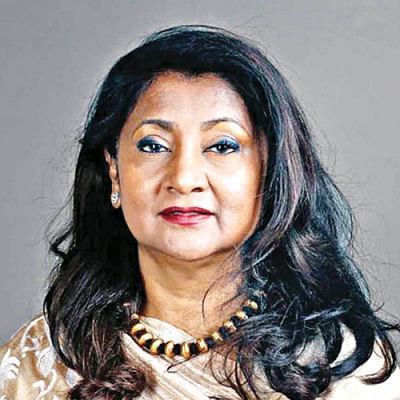
Luna Shamsuddoha - 2016
To even own a computer was rare in Bangladesh a quarter of a century ago, as most people did not know much about the modern technology.
But Luna Shamsuddoha had a very clear idea when she began a business dependent on technological advancement as a young entrepreneur in 1992.
Today, Luna's Dohatec New Media is a leading software company in Bangladesh that has fetched worldwide glory. Since then, she has established a few more companies that have all grown from strength to strength.
Dohatec began its journey as an outsourcing company, mainly doing business with clients in the US. It is now building the e-procurement system for Bhutan, competing with leading global IT solution providers. It is expected to be inaugurated later this month.
"I feel proud to be developing software of global standards that spreads the reputation of my country worldwide," said the chairperson of Dohatec New Media.
"Technology always attracted me and I love to face new challenges," Luna said, narrating her entrepreneurship journey.
The leading lady has been honoured with the Bangladesh Business Awards 2016 in the Outstanding Women in Business category.
Keeping in line with her attitude towards innovation, Luna formed Executive Centre in 1985, which mainly made presentations for executive purposes. It was also a new idea at that time.
"I borrowed some money from my husband and started the presentation business; but changed my mind in 1992."
At that time, she established Dohatec and began content management for US companies. She moved into database management later.
"When we started 25 years ago, the opportunity was tremendous and we tried to capitalise on it."
In 2007, Dohatec developed Bangladesh's voter identity registration and biometric matching system for eight crore people.
The company also provided Bangladesh army with voter enrolment and identification software. The prototype comprised digital voter entry forms, including photos, and fingerprints.
Now the software is widely used for identification, which has also helped build Bangladesh's reputation, she added.
In every step of life, people need their NID cards, meaning, Dohatec's creation is in everyone's hands, she added.
Luna also shared her experience about another development of Dohatec – electronic government procurement (e-GP). It has digitised the country's procurement system; nearly one lakh tenders have already been awarded through the online system.
These two creations of Dohatec have helped establish accountability and bring transparency in the country, and "no one can ignore it," the iconic lady in IT said.
The firm has also participated in a tender to develop Uganda's e-GP system, which is currently being evaluated. Dohatec also provides software solutions and services to institutions, government agencies, and corporations in the US, Canada, Germany, and Switzerland.
It has e-commerce and e-government solutions, and the World Bank, the World Health Organisation, and the US Postal Service are on its list of clients.
The company currently employs around 200 engineers.
"I am extremely proud of the country's young talents and I am sure they will establish Bangladesh as a digital country before our expectation," said Luna, also the vice-chair of the board of trustees at Independent University, Bangladesh (IUB).
There was a misconception that Bangladesh cannot do well in tech related innovations, but now, that mindset has changed. The new generation of entrepreneurs are thinking for the country, which is a positive change, she added.
The company supports the government's birth and death registration projects as well.
In 2001-02, Dohatec developed the United States Postal Service's online mail-tracking system with Harte-Hanks Inc, which is another milestone for the company. It is a fully web-enabled database capable of handling millions of records in a barcode system.
Dohatec is a certifying authority and issues digital certificates, including identification certificates.
The company also won the Bangladesh Machine Readable Visa Project in India that processes 200,000 visas annually.
ICT is absolutely the best medium for work for women to be successful, said Luna, who is serving as a director of Janata Bank from June 2016. Earlier, she served as director of Agrani Bank from 2009 to 2012.
"Without discriminating against any gender, I can say there is no alternative to learning and becoming capable."
She was also the founder and president of Bangladesh Women in Technology, a forum to empower women through technology and encourage girls to study and pursue a career in technology.
Luna has given importance to combating violence against women, especially through ICT. "Without the development of women, nothing will sustain; that's for sure."
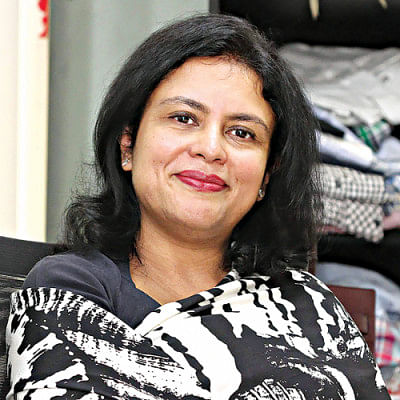
Rubana Huq - 2014
Rubana Huq has been praised for steering one of the most successful apparel companies in Bangladesh: Mohammadi Group.
At the 15th Bangladesh Business Awards ceremony, her name played out as an inspiration for women in the corporate world largely dominated by men. She has been feted for excelling in her professional life both as a leader and a role model.
The pioneering garment maker, Mohammadi Group, began its journey with only one factory in Khilkhet, Dhaka, with 500 workers in 1985.
It now owns eight factories employing 9,000 workers. It exported goods worth USD 70 million last fiscal year with 15 percent year-on-year growth.
Rubana joined the company as a junior officer in 1995, and it was her dedication and hard work that elevated her to the position of managing director in 1998.
In the beginning, three friends had joined hands to set up the company that exported only USD 5 million a year between 1985 and 1995. Later, two of them sold their shares to her husband Annisul Huq, chairman and chief executive of Mohammadi Group.
Going from strength to strength, Rubana showed her managerial and entrepreneurial calibre to take the company to a new height.
A trailblazer, Rubana is setting up a new factory at Bangla Bazar in Gazipur where 600 workers will have accommodations and will be given the ownership of the dorms after six years of their stay in exchange for a monthly instalment.
Bangladesh Bank is helping the project with Tk 20 crore in loans at 2 percent interest.
Work on the new factory is expected to begin in October. "We will employ 1,000 more workers to produce woven garments," Rubana said.
The factory will have green building certification or LEED that stands for leadership in energy and environmental design.
The group has reached its current status without any major loan from banks, as profits were reinvested to expand its footprint.
Rubana credited the garment company's success to the female workforce that works relentlessly to churn out products to the global buyers' satisfaction.
"So, all entrepreneurs should invest in developing human resources. Our entrepreneurs also need to take a hard look at the people working in the factories."
In her career of 19 years, Rubana has not only expanded the garment segment, but also diversified to other sectors such as real estate, software, and power plant.
The group distributes Indian STAR television programmes in Bangladesh.
"I mainly manage the garment business and I am not involved much in the management of the other companies within the group."
She said she always incentivises good performers to encourage them. "I hold regular talks with officials and workers. Such interaction between top management and workers bridges the gap in communication and results in higher efficiency."
On future expansion plans, Rubana said the group will invest in media on a large scale as the prospects are bright.
In the next few years, the group plans to expand the garment business by at least 30 percent and grow its agro business in organic products.
"Just increasing the number of units is not my objective. My main target is sustainability. I want my company to grow at international standards so nobody can question compliance or the quality of products."
Swedish retail giant H&M is the group's main buyer, taking 60 percent of its products. Mohammadi Group also supplies garment items to many other renowned retailers and brands worldwide.
"Credibility is a big asset. My workers are hard-working and I personally visit them and listen to their problems on the floor and try to solve their problems," she said.
Mohammadi Group currently runs two primary schools for the children of the garment workers. It plans to open similar schools in all its garment factories in the future.
In her 19 years as an entrepreneur, Rubana has worn more than one hat. She was among BBC's 100 outstanding women in 2013 and 2014.
The Bangladeshi entrepreneur also writes extensively and is a philanthropist.
Rubana dreamt of becoming a university professor when she was young.
"I did not give up on my dreams. I've recently completed my post-graduation in English from a private university."
"People must not give up on their dreams, even in the face of challenges. We must always pursue our dreams to grow."
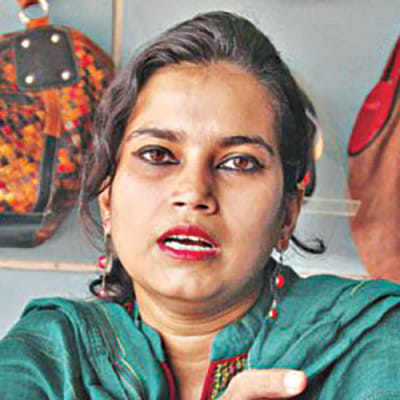
Tania Wahab - 2013
Walt Disney once said that all dreams come true if there is courage to pursue them, and nowhere does it resonate more than in the case of Tania Wahab, the owner and managing partner of Karigar, a thriving leather goods company.
Fresh out of university, with just Tk 10,000 in hand and opposition from her family, she set about fulfilling her childhood dream of owning a business. And that company today, after nine years, has managed an annual turnover of over Tk 1 crore.
"It was incredibly tough in the beginning. I had no support from my family and I came from a non-business background. But I always had the strength of conviction in me."
Her venture of choice was a leather goods manufacturing company, having obtained a BSc from Bangladesh College of Leather Technology.
"The four-year educational background gave me immense faith," she recalls.
She bought a sewing machine, hired a worker and rented a dingy small room for Tk 3,000 at Hazaribagh.
And to make up for her non-business background, she spent days on end at the cluster of leather factories in the neighbourhood to learn the nitty-gritty of the trade.
Back then, the majority of the leather firms would copy designs from a select few external sources, meaning their products would more or less end up looking the same.
Seeing the gap in the market, she opted to design the products herself and infuse novelty in them such that they stand out from the crowd.
Karigar initially concentrated on corporate gift items, with Tania Wahab personally marketing the products door-to-door.
"I did it all myself. But I was always confident that I would get there."
Her big break came when Eastern Bank Limited commissioned her to make 600 diaries – and there was no looking back since.
Indeed, her creations were a hit in the corporate world; so much that in 2008 she had to find a bigger factory space nearby to fulfil all the orders.
Karigar now employs 20 full-time workers and 100 part-time ones and its clientele includes British American Tobacco Bangladesh, Grey Dhaka, BASIC Bank, Mutual Trust Bank, East West University, Chevron Bangladesh, Grameenphone, Sanofi Aventis, and Orion Group.
Reassured by the success of her corporate gift items, Tania Wahab decided to expand Karigar's portfolio. She included handbags, purses, photo frames, jewellery boxes, and leather garments.
Meanwhile, she cracked the export market as well. Her first direct export went to the UK in 2008, following which she sent out items to Switzerland, Japan, India, and Cambodia.
"But I am more focused on the domestic market, which is huge in size," she said, adding that 80 percent of Karigar's products are sold locally.
Tania Wahab, however, is disappointed that the country's leather industry has not progressed as much as she had hoped.
And for that, the traders are partly to be blamed: they still prefer products made in China, Thailand, and Taiwan.
"But we can make the same product of the same quality. And the fact that we manufacture for the export market as well is testament to our capabilities."
As for her future plans, she said she wants to make Karigar a household name and set up a dedicated factory complete with modern amenities for the export market.
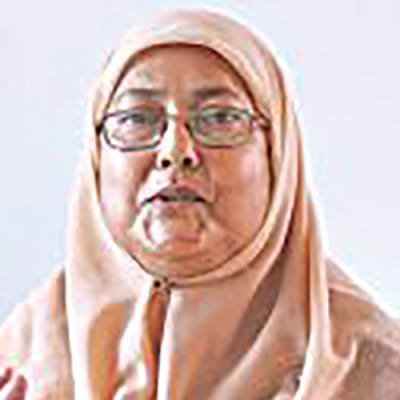
Masuda Islam - 2012
Masuda Islam's journey as an entrepreneur began in the mid-1980s, upon completion of her undergraduate degree.
For a brief period, she taught at a school, but the job did not gratify her enough. She wanted to do something that would leverage her creativity and the skills she had picked up during her time at university.
And one day that opportunity came, when she was in Mauchak market with her daughter.
Her daughter was clad in a frock made by Masuda, which caught the attention of one kids-wear vendor.
So much so, that he went up to her to enquire where the dress was from.
Upon learning that the piece was all Masuda's doing, he straightway ordered several iterations of the frock for his store.
"I accepted the offer on the spot, although I had no extra money on me then to buy the fabrics and accessories needed for the multiple frocks.
The pay day, too, was a good few days away. Still, I decided to take the risk," Masuda fondly recalls.
She borrowed Tk 500 from a relative as soon as she got home and headed straight to Gulistan to get the materials.
She managed to make 18 dresses in total, which fetched her Tk 1,800 in one go.
Not only that, it opened the floodgates for her: she returned home with more orders, and there was no looking back since. "It was an exciting and proud day for me."
Before long, the venture needed all her time, so she decided to leave her job at the school.
Still, it was not enough; she had to call upon extra help to stitch the dresses, which were selling like hot cakes.
Empowered by the runaway success of her clothing business, she decided to try out other things.
She spotted that the country was lacking in frozen snacks market, and in 1996, she started her ready meals business, from her kitchen.
She started off with supplying three frozen snack items to a large departmental store at Gulshan. Just like her dresses, her food items, too, received an overwhelming response.
In 2000, she shut down her other venture to concentrate on her fledgling food business full-time.
"The dress-making business was serendipity for me, and I looked at it solely as a source for making money – there was no overriding passion for it. But my entry to the food business is a different story altogether. I always had this desire to devote myself for social causes, and providing safe food was the perfect way."
Today, her firm Protina BD Foods makes 100 items, including frozen snacks, sweets, bakery, and vermicelli, under the brand Protina.
She employs 26 people, and her asset value stands at more than Tk 1 crore.
She, however, continues to supply frozen snacks to Agora and other supermarkets, with all the items made under her supervision at home for quality control.
Masuda, a mother of two, says juggling a family and a growing business did not come easy to her. "All of it would not have been possible without the unconditional support from my husband and family."
Now that her children have grown-up, Masuda has chalked up grand plans for her company.
Next in her scheme of things: supply safe vegetables and processed carrot noodles.
However, she is not aggressive in her expansion bids; rather she wants to go slow.
"I believe in quality. If I go for a huge expansion hastily, it may be difficult to maintain quality," she says.
"I don't want to compete with others through massive expansion and sales promotion. I want to compete through higher quality."
Everyone who is engaged in food business should focus on making safe food, she says, adding that she has been working to find ways to offer pesticide-free vegetables.
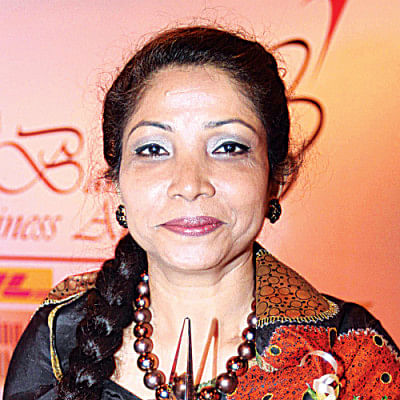
Sharmin Hossain - 2011
Even as recently as 2008, Sharmin Hossain was a full-time homemaker, with no plans whatsoever of starting a business of her own.
Then the random use of harmful chemical for ripening and preserving fruits and vegetables became rife in Bangladesh, which led the protective mother of four with a degree in agriculture to grow fruits and vegetable on a shared family patch for her family's consumption. And there was no looking back.
Motivated by good yields and overwhelming requests from friends and neighbours, Sharmin started considering cultivation on a commercial scale and soon immersed herself in research and development.
Then in 2010, with a group of professionals she formed Fresh and Safe Agro Ltd (FASAL) with the aim of supplying chemical-free products.
"We have established the company to address the issue of scarcity of pesticide-free fruits and vegetables," said Sharmin.
"It is a safe fruits and vegetables producing and marketing company with the ambition of becoming the key fresh vegetable producer, processor, and marketer."
Sharmin, who mainly manages the technical aspects of the company, said by and large farmers use different varieties of pesticides, which are extremely harmful.
Most of these unsafe and adulterated produces end up in the capital where these are consumed by unsuspecting consumers including children, said the wife of a senior police official.
FASAL's fruits and vegetables are grown under safe conditions following global standards like Integrated Pest Management (IPM) and Good Agricultural Practices (GAP).
"We have started to work as a bridge so that the consumers get fresh and safe fruits and vegetables directly and to ensure that farmers get fair price," said Sharmin.
She said handpicked fruits and vegetables are washed using safe water to eliminate soil and dirt, sorted to make those free from rotten and decayed ends, graded to different sizes, shapes and weights, and packed with environment friendly materials to keep them fresh and safe.
Sharmin said the company has contract growers of fruits and vegetables located in Manikganj, Narsingdi, Bogra, and Dhaka and currently works with more than 12,000 trained farmers.
All the contract growers are involved in regular training and auditing system, using IPM and GAP standards.
"These training and audits ensure that all FASAL branded products meet the required safety regulations," Sharmin said.
She said farmer's training is one of the company's core business activities and they select farmers after several screening process. The chosen farmers are then given several days of training.
The FASAL field officers, who have diploma on agriculture, work with the farmers and teach them how to farm fresh produce by using safer chemical-free inputs.
The company collects the agro commodities from the contract farmers at higher prices compared to the local market prices, according to Sharmin.
"We generally pay Tk 2 more per kilogramme over the local market price to the farmers to encourage them."
Many farmers are keen to join the company's network to get fair prices for their produce. "Farmers want to join our network as it will give them a guaranteed market to sell their produce."
A venture of around Tk 2.5 crore, the company currently employs around 100 employees.
But the requirement of labour varies according to seasons. For example, in winter, the company hires extra workers to handle the additional output arising from winter vegetable harvest.
Currently, the company sells around 50 kitchen and food items through its eight sales centres in Mirpur, Mohammadpur, and Banani areas, with monthly receipts of around Tk 20 lakh.
It also sells the agro-products through mobile vans in Uttara and Dhanmondi.
"It aims to start another 20 outlets in prime location of the capital by December," said Sharmin.
"If we can serve only one percent people of the Dhaka city, we are looking at figures of Tk 100 crore a month."
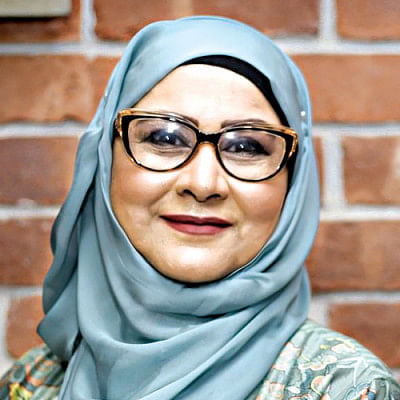
Tanya Tazeen Karim - 2010
Seventeen years ago, she started it with a small investment that could only buy her a computer, some stationery items such as tracing paper, drafting pens, and some books on architecture.
Today, architect Tanya Tazeen Karim is among a few women entrepreneurs who earned fame both at home and abroad by designing buildings.
Tanya formed a partnership with a classmate, Nurur Rahman Khan, after graduating from Bangladesh University of Engineering and Technology (Buet) in 1990.
Three years later, their firm, Tanya Karim NR Khan & Associates, was officially registered.
"We started with minimal capital. We could not rent office space. We had used a small bedroom in my apartment as our first office for the time being."
Her major breakthrough came in 1993 when Tanya and her team worked on the interiors of the Beximco Pharmaceuticals headquarters in Dhaka.
Since then, she has never looked back. The orders started flowing in from multinational banks and other companies.
The firm's next breakthrough came when it designed a residential building owned by Annisul Huq, a leading businessman.
Her work also involves interiors, landscaping, master planning, and graphic designing. All are part of an effort to make Tanya Karim NR Khan & Associates a one-stop service centre.
Tanya also had to fight other issues. "Initially, I had to overcome gender bias to come this far. Everyone around me thought that I knew nothing."
"When one saw that my technical knowledge is sound and I am capable of delivering what clients ask for and giving decisions on the site, the situation changed and respect grew."
Tanya rates herself as a successful entrepreneur. "As a business entrepreneur, in terms of money, we will not say we are very much up in the ladder. But in terms of quality of services, I think we have advanced a lot."
"We have been able to earn the respect of society and business clients. We have played a key role in changing interiors and office interior designing. I think we are a pioneer in quite a few aspects," Tanya said.
Tanya and her team have done some international works.
"We designed the Bhutan Telecom building and a mosque in India. We have also worked in Malaysia, China, and Thailand."
"We had to compete to win such projects. We are proud of our team and works."
"Our vision is to become a global design house that will be internationally recognised," she said.
Tanya said architecture is one of the few areas that allow women to shine.
"I think professions such as architecture and interior designing suit women the most in a sense that you can design from home as well."
Fifty-seven people work for her firm on a regular payroll, with another 150 people on contract. Tanya said trust and respect are important for a long-lasting partnership.
"We have built a partnership. The basis of our partnership is complete trust and respect for each other."
She said the scope for architects and interior designers has expanded.
"After the 90s, the trend began to change, as people travelled more and came to know the importance of a good design. The knowledge base of the clients has gone up."
According to Tanya, maintaining a balance between one's career and family life is important. She thanks her sons and husband for helping her through everything.
"I have been able to maintain a balance due to their understanding."
"My husband, parents, and in-laws have helped me a lot. For a woman, this type of support is crucial," said the mother of four.
She said teaching is helping her to relate to the younger generation. She considers teaching a way to give back to the society. "It is my social responsibility."
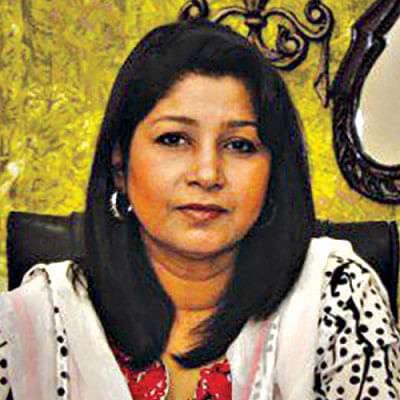
Kaniz Almas Khan - 2009
Unlike many of her contemporaries, Kaniz Almas Khan showed the courage to venture into the beauty business in the late 1990s. She was determined to be the best in the field.
"When I planned to start my career, I thought of something different and big. That's how I came to the beauty industry," she said.
Kaniz opened beauty salon Glamour in a 2,000 square feet room at her residence in Kalabagan in 1990, with nine workers and an initial investment of Tk 2 lakh, she borrowed from Micro Industries Development Assistance and Services (MIDAS).
It did not take long for the salon to teem with clients. "From the first day, we tried to provide the clients with the best quality skin and hair care services, and also bridal makeover. Soon the number of clients went up as there were only a handful of quality salons in the city at that time," she said.
The major breakthrough in her career came in 1991 when world-famous brand Unilever made her the "brand ambassador" for Sunsilk.
This brought her countrywide recognition as an expert in hair care and inspired many small entrepreneurs to get involved in this business.
"In 1998, Glamour was turned into Persona Hair and Beauty Ltd, a 3,400 square feet salon on Road 27 in Dhanmondi, with 200 workers. Its area was further expanded to 11,000 square feet in 2002," said Kaniz, narrating the story behind Persona.
Over a span of 19 years, she has established a brand in the beauty industry, running two separate companies – Persona Hair and Beauty Ltd and Persona Beauty Care Ltd.
And the brand, Persona, has now grown into one of the most profitable beauty service providing ventures in Bangladesh with an annual turnover of Tk 14.64 crore and average daily sales of Tk 5.25 lakh.
The company employs 1,400 people, of whom 1,200 are service providers and 200 are corporate executives. And of the total workforce, 99 percent are women.
Later, Kaniz initiated several ventures, including spas, gyms, a studio, and a lifestyle magazine.
The company introduced Persona Health, Spring Spa, Adams' for men, and Persona Institute of Beauty and Lifestyle.
The beautician said the industry suffers from a lack of training institutes on beauty services.
"The people, who are eager to work in the industry, lack training and skills. We opened an institute in Dhaka.
One or two other institutes were launched recently, but their number is still very small, compared to the demand," she said.
Persona Hair and Beauty Ltd also runs an independent studio and monthly publication "Canvas."
Business is not always easy for Kaniz, as frequent power cuts often hamper services.
Kaniz feels the absence of an association to protect the industry's interests.
In 2004, she introduced the "Best Worker Award" at all her salons, where a meritorious and hard-working employee is awarded every month.
Simultaneously, she is involved in social work like providing training and financial support to female victims of domestic violence and acid attacks. She often employs them.
In 2005, she started training 25 acid victims from the Acid Survivors Foundation and 23 of them now work for Persona.
In 2008, the company joined hands with Development Assistance for Background Society, a non-profit organisation, and provided scholarships to 10 students from Dhaka University.
She also extends her efforts to other social responsibilities, such as creating awareness on cancer and regular tax payments.
Kaniz is the spokesperson for the "Cervical Cancer Campaign" initiated by GlaxoSmithKline and the National Board of Revenue.
"I work hard to ensure high quality service for my clients. It helped me pursue my dream to be the best in this industry," she said.
"Success comes when you are true to your dream. That's why Persona is successful today," said Kaniz, with a smile.
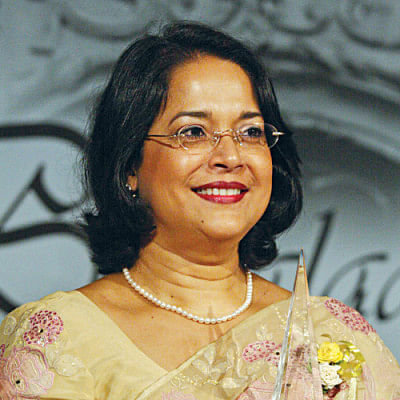
Sabrina Islam - 2008
Sitting at her Gulshan showroom of Reflections that was literally crammed with decorative glasses, kitchen cabinets, bathroom panels, and ceilings to amaze the visitors instantly,
Sabrina says: "Unavailability of decorative art glasses in the local market prompted me to get involved in such a business."
"I hit upon the idea of working with decorative art glasses when we were preparing to build our house in Gulshan in 1997. We planned the house do-ups with etched and stained glasses that were not available in the local market then," said Sabrina Islam, who emerged as the Outstanding Woman in Business for 2008 as part of the Bangladesh Business Awards jointly given away by The Daily Star and DHL Express.
Deeply devoted and loyal to art and creativity, Sabrina launched Reflections as a small enterprise in 1998 with two workers in a small 400 square feet studio at Eskaton.
"Initially I started producing etched glasses and sandblasted glasses. Luckily, I got an order for doing interior decoration of a house in Gulshan and they liked it very much," says Sabrina.
"Within a short time, I started getting orders from individuals, restaurants and corporate houses," she says.
"In 2000 we shifted to a 2,200-sft studio at the current Gulshan address to widen our production ranges from sandblasted, engraved, and coloured glasses to stained glasses."
In 2002 Reflections signed an agreement with Stained Glass Overlay (SGO) in a bid to expand further into a full-service studio specialising a wide array of designer glass products.
SGO is an international franchise company based in California and one of the world's biggest players in the customised decorative and architectural art glass sector.
Sabrina opened Reflection's second showroom in Chattogram in 2005.
"This was an important landmark in the company's evolution, and a significant milestone in the development of the decorative glass sector of the country," she says.
"2008 was another important year for the company, as we launched our interior designing section and also started franchising decorative products of wood-iron composite and durable life-film products in the same year," she adds.
She set up a bigger plant in Mirpur, which is likely to be the main factory of the company.
Now Reflections produces seven types of glasses – stained glass overlay, traditional stained glass, sandblasted glass, engraved glass, coloured glass, etched glass, and bevelled glass.
The company is undoubtedly the country's leading crafted art glass producer, designer, and supplier as it holds nearly 40 percent of the total market share.
The company has 24 employees with an annual turnover of over Tk 50 lakh.
Sabrina's journey as a working woman started 24 years ago.
She signed up as a voluntary worker at Karika, the oldest handicraft organisation in the country, in 1975 when she was a student of LLB at Dhaka University.
"Joining Karika was the stepping stone of my career. After being a regularised staff in 1976, I started to manage the company's marketing, sales, and inventory, altogether," she says.
"That time I got intensively involved with handicrafts and the designers of the country. Since then, the desire to explore the crafts and designs started growing in me."
In 1977 she was awarded a one-year scholarship for a diploma programme on small business management from Ford Foundation at Washington DC.
The scholarship was given under the programme of the foundation's Decade of Women that aimed to empower women.
"During the scholarship programme, I found business more interesting compared to practising law. So, after returning from the US, I decided to start my own venture," says Sabrina.
"Then I did my MBA from the Institute of Business Administration at Dhaka University."
She worked at Karika until 1980, the year she got married and decided to join her husband's venture. Her husband was setting up a garment factory, Concord, in 1981.
She joined Concord to oversee the company's sales and marketing activities and soon it started exporting garment items to the US and Europe.
In 1985, she launched Rainbow Children's Boutique to sell children's garments, school uniforms, including shirts, sweaters and ties, and other personal care products.
Those were a hit among the urban working women and famous kindergartens in Dhaka.
In 1998, Sabrina floated Reflections with an initial investment of Tk 2.5 lakh.
She took part in some training programmes on sandblasting and traditional stained glass making in the US, Thailand, and India.
She also often sends her staff abroad, mainly to India, and Thailand, to help them gain expertise and strengthen knowledge in glass art.
Now she plans to expand the reach of Reflections and start exporting her designer glasses initially to the neighbouring countries.
However, her efforts were not left unnoticed. She received the FBCCI Standard Chartered Bank Outstanding Woman of the Year award in 2006. She also clinched the Most Outstanding Business Woman Award in 2008 in Doha from the 3rd Business Forum of the Islamic Countries.
However, her business often faces setback on power shortage and unavailability of raw materials in the local market that affect production badly.
"Outage is the main problem that holds back the local industries' faster growth. I can't afford a big generator to overcome the losses I incurred due to electricity shortage," she says.
She suggests the government develop local expertise for producing raw materials like different colours and bonding materials for decorative art glass that will make the industry more cost-effective.
She also calls upon the government to ensure a better law and order situation in the country to attract more women to entrepreneurship.
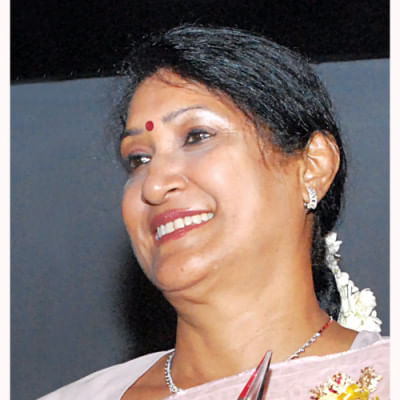
Nilufar Farooq - 2007
Nilufar Farooq's tiny empire was not built in a day. But her creativity, dedication and commitment to work have helped her dream come true.
Gifted with a natural aesthetic sense from her childhood, she had an urge in her mind to do something special.
She learned the art of flower arrangement, opened a small business house, and earned name and fame in a span of 16 years.
Nina is Nilufar's nickname. When Nina talked to The Daily Star, she spelt out how her passion for beauty turned into a profession.
In 1992, she along with one of her school friends and her ikebana teacher rented a small shop at Dhanmondi in Dhaka.
They spent even the last penny of their personal savings. Each of her partners contributed Tk 2.10 lakh.
They took the possession of the shop at Tk 5 lakh and the rest amount was spent for decorations of Ikebana.
The breakthrough came just one year after the journey of Ikebana.
During the seventh Saarc Summit in Dhaka in 1993, Nina, the managing partner of Ikebana, and two other courageous woman entrepreneurs were awarded the decoration work of the Dhaka Sheraton Hotel where the heads of state and government of the Saarc countries were staying.
"Since then, we did not need to look back," says Nina. Her business partner Inu Shamsuddin echoed the view and said, "Now we are so busy that we have no weekends. Every day we have some work orders."
The third partner was Mrs Zoha who left the country for Japan after being involved in the business for around two years.
Nina has done more than 5,000 projects in 16 years. Some of her significant works are floral decorations during the state visit of some dignitaries like Bill Clinton, Yasir Arafat, Prince Aga Khan, Queen Elizabeth II, Prince Charles, and Princess Anne.
Nina also decorated several prestigious venues that include Bangabhaban, Ganobhaban, state guesthouses, and International Conference Centre at the Prime Minister's Office (PMO).
Although Ikebana's business turnover reached Tk 1.42 crore in fiscal 2005-06, it dropped to Tk 87 lakh in FY 2006-07 due to the country's difficult political situation.
Now Ikebana is housed in a 3,000 sq feet office in the city's posh Banani area and it has drawn a wide range of customers – embassies, banks, corporate offices, industries, etc. Its business has been expanded to landscaping, indoor pot plants, roof gardening, and water fountain.
"Flowers always attracted me since my childhood. I loved to pluck them and make necklaces for my mother, my aunts, and friends. I would make flower arrangements for other people who visited our house."
Nina was born in Kolkata, the working place of her father Luthfar Rahman, a former jute businessman. Her maternal grandfather is renowned poet Golam Mostafa.
"My love for beauty generated in my family. And that love has brought me into the business with the art of flowers. I was a listed singer of BTV and Bangladesh Betar in the 70s. Classical music was my favourite. But the passion for flowers and beauty surpassed my music career."
But her maternal uncle Mustafa Monwar (famous artist) inspired her to a great extent by giving her a book on ikebana, the Japanese art of floral decoration, in the early 70s. "That was a major influence to go ahead with the art," she reminisced.
Nina later took training in the art in 1973 from the Japan Embassy in Dhaka. She received gold medal for exceptional performance in the training. She also acquired advanced knowledge on ikebana through distant education from famous Japanese school O'Hara.
She taught ikebana for 10 years at the Japan Embassy in Dhaka and later at a school.
"Ikebana is not an easy task. One should have the idea of architecture for drawing and design," Nina says, "Many people often ask me whether I am an architect or not."
When asked whether her business career does any harm to her personal life, she replied in the negative saying: "I got married in 1969, before my graduation. I had three children who I took care of without any disturbance of my work."
In response to another query, Nina said her husband, who is now leading a retired life after his successful career as a chemical engineer, never created any obstacle for her work, rather inspired her.
"My friends and relatives were astonished to see how I could manage my business after taking adequate care of my children," she says. "But business was in my blood as my father was a big jute businessman at that time," she adds.
"I am very disciplined, so is my whole family. I always get up early in the morning and do some work for my family before going to my workplace," she continued.
"Nina is crazy for work. I have seen very few guys like her in my life," Inu, her school friend and business partner said.
Nina takes the least interest in bank borrowing. "We prefer our small personal savings to any bank loans. Because the bank loan may turn into a burden for the organisation," the successful businesswoman said.
The flowers Nina's firm uses for decorations are often imported from foreign countries, such as Thailand and China, on the basis of the demands from customers.
Ikebana believes in professionalism and is ready to render maximum benefits to its employees. "But I can't compromise with the work and quality," Nina says.
Finally, the Ikebana chief could not help expressing her frustration over the new generation's poor knowledge of the flora and fauna, which takes them away from nature.
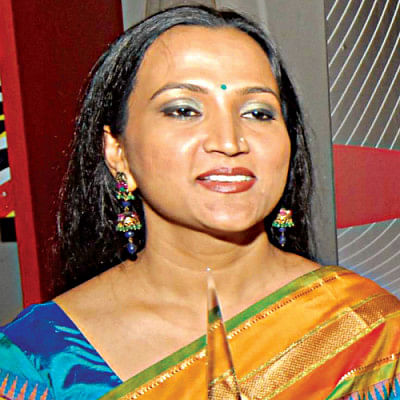
Jinet Fatema - 2006
She is a self-made entrepreneur. She has been able to show how items deemed waste can be transformed into exportable products just through creativity and integrity.
This is Zinet Fatema, one of the most innovative woman entrepreneurs in the country. She owns Jahan Metal. And she has left a mark of outstanding performance in the domain of industrial periphery.
Springing up her factory of metals, tin, and glass materials in 1998, Fatema started exporting to Europe in 2000. Turning out metal garden accessories, bakery utilities, shoeboxes, umbrella and candle stands, vases, jugs and glasses, and bowls, Jahan Metal's products are uniquely attractive with a rustic and hand-hewn look.
Born in Chattogram in 1969, Fatema aimed to be a lawyer from her childhood. She said that she was attracted by the lawyer's apron during her childhood. But I had to change my vision, while I discovered myself to do something on my own.
After being married in 1991, her husband Md Zakirul Islam, a handicraft businessman, always inspired her to venture into business.
But most of the time, Fatema refused his proposal, as she intended to start out on her own. The door was opened when her husband decided to put down his handicraft business.
A self-made and independent woman, Fatema even turned down a proposal of financial assistance from her husband and other family members.
When asked about how she copes with the greatest failures in her career, she remarks laughingly that her spirit of sportsmanship motivates her to venture into unknown areas that have potential.
She reveals she started her venture with a minimum amount of Tk 1 lakh.
At one stage, she could overcome the financial crisis when one of her buyers came forward to finance her business and she established a glass factory near Narsingdi district.
And her metal factory, established with Fatema's own finance, is located at Uttarkhan in Uttara, Dhaka.
Earlier, Fatema got some experience of making oyster jewellery and some other handicraft items when her husband was involved with such business. But she did not think that her metal and recycle glass item could be exported.
"I thought business is a matter of huge investment and huge return," Fatema said.
Fatema used to visit some international fairs as part of her husband's business.
While visiting such a fair at Frankfrut in Germany, Fatema found that some Vietnamese traders showcased recycle glass and tin made items for export purposes.
Fatema was surprised to see the simple product at an international fair, which was widely available in the Bangladeshi market.
Upon returning home, Fatema visited some local glass and tin factories to get ideas about the business.
With a little amount of money, Fatema started her venture of Jahan Metal.
Her metal products became popular to some of her foreign buyers and she showcased some local recycle glass items to another international fair.
She was depressed, as she did not get any spot order from the fair.
Fatema said, "It was not very easy for a woman to get global recognition for very simple and traditional items. But I was determined to do something in the global market with my very simple products."
And over time, she succeeded in attracting buyers and received huge appreciation while her metal and recycle glass products turned into a profitable business.
This encouraged her to concentrate on her business as a full timer. Eventually, Fatema's metal and glass items became a popular among her buyers in Europe and the US.
Several factors had drawn Fatema's attraction to such handicraft: firstly, this was not a field she was familiar with, secondly, she felt that this was an enterprise of something exceptional, which involves local and foreign clients.
Fatema is happy that her family life is not hampered at all because of her business, she can stand beside her children in case of their illness and help them finish their homework, as the office is set up in a part of her home.
Fatema's determination, passion, and commitment have made Jahan Metal what it is today.
She has recently started supplying to the local market, although the bulk of the products are meant for export. The export market for handicrafts is very complex as the taste and requirement of consumers are always changing.
Through participation in international trade fairs, Jahan Metal came in contact with the buyers directly and receives information about the present trends in the market.
Fatema believes that professionalism is the pillar of growth and success.
Her organisation is divided into four sections: marketing, procurement, production, and export.
All the departments are supervised by respective managers, who directly report to her. When recruiting new people for her ever-expanding company, new incumbents receive hands-on training from the supervisors.
During the training or probationary period, candidates are kept under observation for sincerity, intuition, and working attitude.
They also receive training on workplace safety, and first aid facilities are provided on time, as and when needed. Gender balance is a concern among the factory workers.
The metal section employs 16 women and the glass unit employs 150 women. Some of the workers are from the minority communities.
Her efforts have been previously recognised and awarded by the Dhaka Chamber of Commerce and Industries, and she received the Best Innovative Woman Award.
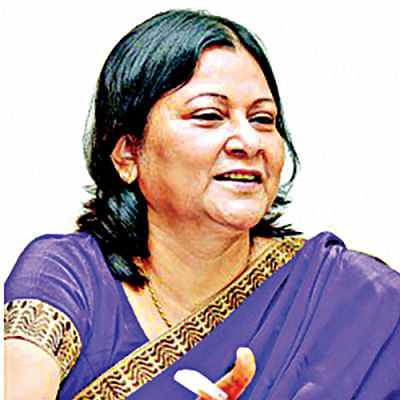
Hasina Newaaz - 2005
In the early 1980s, it was difficult for a lot of people in this country to believe that women can do serious work.
For them to accept that a woman in her early 30s can run a printing business successfully was almost unthinkable.
The young woman who took on this challenge headlong was Hasina Newaaz, who over time has been able to break a lot of norms and change a lot of minds through hard work and drive.
Printing is detail-oriented work and Hasina, being extremely meticulous and sincere, has naturally thrived in this field.
Hasina Newaaz was born in Bagerhat in 1951 in an educated and progressive family.
Her father, Mr Abdul Hasib Chowdhury, also operated a press. He had involved her in his activities by taking her along to the presses and discussing his business at home.
Hasina learned to believe in herself at an early age as she was never looked down upon as a girl by her family.
She finished her masters in Bangla literature at Rajshahi University in 1974 with stellar academic results, and after getting married in the same year, moved to Dhaka.
Hasina still considers herself blessed in marrying a person who is equally progressive in his views and has provided unfaltering support to her over the years.
While settling down in Dhaka in the mid-70s, Hasina seriously considered her career options amidst numerous financial constraints.
As she was expecting her first child at the time, she decided to refuse the offer to join Bangla academy and, instead, invested in a typewriter to write to various international contacts in search of export opportunities.
A stroke of luck brought her in touch with a trader in Hong Kong who used to import live turtles from Bangladesh in 1977.
Hasina bargained hard with this trader and eventually managed to get a trial annual order of 16 metric tons from him.
Being extremely resourceful, she quickly found a group of people in Narayanganj to regularly supply her with turtles.
Hasina still remembers the trepidation with which she exported her first lot. She continued to do this for about a year up until environmental protectionists began protesting against the mass export of an indigenous specie.
Hasina started thinking of a second business idea. Again, coincidentally, she corresponded with a Singaporean trader who sold Japanese printing presses and, out of sheer curiosity, one day asked him the price of his presses.
Now, at that time, the presses commonly used in Bangladesh were all German ones that were priced high at Tk 8-9 lakh.
The Singaporean agent told her that second-hand Japanese presses cost around Tk 2-3 lakh which surprised Hasina and got her dreaming about one of her own.
After rigorous saving of every taka possible over the years, Hasina finally mustered up the courage to tell her contact to get her a press, which eventually reached Dhaka in 1982 at a cost of Tk 1.75 lakh.
The introduction of Japanese machines saw changes in the whole industry and set up a new way of printing which was beneficial to a lot of people in later stages.
Several factors had attracted Hasina to printing: firstly, this was a field she was familiar with.
Secondly, she felt that this was one enterprise which involved dealing with educated clients. From her father's experiences, she knew this was a profitable profession and demand for printing would increase in future.
She also realised that she would not have to sacrifice her family life if she engaged in this, as she could easily help her children with homework and care for them during their illnesses as the presses were set up in a part of her home.
But with her first press installed, Hasina now had to battle against the prevailing bias against women and secure her first work-order.
And this was not an easy challenge. Whenever clients heard the person running this is a woman, they shied away.
Hasina got her first break when she approached one of her husband's acquaintances and brought him over to visit the factory. Convinced by what he saw, this gentleman agreed to give her a small piece of work. For Hasina Newaaz, there was no looking back.
Hasina started receiving an increasing number of orders and her reputation for quality and sincerity spread, which again brought in new clients. But as soon as Hasina found her initial footing, she adopted a selective strategy.
She wanted to work with clients she herself was comfortable with and ones with whom she would not have to worry about payment. Her client portfolio today includes blue-chip names like Square, Orascom, UNDP, Nestle Bangladesh, ACI, and Novartis.
Her set-up includes eight machines, 100-150 people, and an annual revenue number of over Tk 37 million. Hasina runs her show methodically and understands the value of appropriate systems, after having learnt on-the-job and from her multinational clients.
The printing business is not without its challenges. Hasina recalls the infinitely long hours she has spent in the press as machines break down, proof-reading is time-consuming and, as in recent days, electricity supply becomes erratic.
But Hasina remains resolute in her service. She has never fallen behind a deadline and her clients have come to rely on that.
Nothing has posed as big a challenge as the electricity supply these days, which has forced her to outright refuse many orders.
Profit levels in this sector have also suffered as competition and cost consciousness have led to prices dropping every day.
Hasina is enthusiastic about the future of printing in Bangladesh though.
"We are still working with second-hand machines and no one amongst us has the ability to buy a world-class piece of equipment. Furthermore, our labour skill and productivity could increase phenomenally with training," she says.
These improvements will help Bangladesh enter the export market that China has conquered.
Having juggled well the Herculean tasks of a demanding profession and home chores in her early years, Hasina today lives contentedly with her husband, children, and grandchildren.
She is ever cognisant of the importance of women's economic self-reliance in her immediate circle and insists that her employees educate their daughters.
From her own experience, she also knows that, for a woman, support from the husband and family plays a vital role in the whole success formula.

Selina Quader - 2004
It all started with a casual hobby and genuine interest that, over time, turned into a successful and export-oriented agri-business.
Selina Quader was born in Jessore in 1947. Her father was a lawyer by profession but he took a keen interest in gardening that he shared with the rest of his family.
Selina graduated from Jessore Women's College in 1967 and married an agri-scientist the following year.
When her husband, Dr Shaikh Abdul Quader, returned from Germany in the early eighties, he was posted in Chuadanga.
Selina was excited by the large piece of land that was available within her home premises and promptly started growing a kitchen garden. Soon there was no looking back.
She reinvested everything she earned from selling her vegetables into leasing more and more of nearby land and grew an increasing amount of produce.
Now, her total area of production is nearly 200 acres including her own land, leased land, and those of her contract growers in Chuadanga and Thakurgaon.
Her direct employees number over 200 and her total turnover reached Tk 25 million in 2004 after demonstrating an impressive growth rate in the last five years.
Her company, Agroconcern, works closely with clients and contract farmers on both production and marketing aspects.
Inspired by her success, Selina's neighbours in Chuadanga have also joined the bandwagon of vegetable production – now almost 6-8 truckloads are shipped every day from the vicinity for destinations in Dhaka, Chattogram, and Sylhet.
With this spectacular performance in a previously arid geographical region, has come the benefits of economic development for all; villagers in the area now have access to electricity, concrete housing, and Selina's previous workers themselves have now moved onto their own lands.
Even though Selina's production basket includes a whole variety of items like cauliflower, cabbage, broccoli, capsicum, papaya, egg-plant, rice, maize, watermelon, and sugarcane, her biggest success so far has been her potatoes.
At first, she grew the seeds herself with the help of her husband to produce a variety that is high-yielding and disease-free. Large-scale production ensued in 1990 with the help of contract growers.
Prompted by high acceptance of these potatoes, she first exported four containers in 2000 to Singapore; since then, she has also exported to wholesalers in Sri Lanka and Malaysia.
Furthermore, after three years of research, she has found a new variety of tomatoes that can be grown even during rainy seasons.
Selina plans to produce this highly-demanded strain in bulk next year. Consistent quality in all her products is ensured by importing seeds intermittently from European countries and by bringing in foreign technicians to monitor progress.
Selina's journey to this day definitely has not been obstacle-free. As is true for all other agricultural produce, she is plagued by the middlemen who dominate the supply chain and eat up a chunk of the total margin.
Lack of access to financing is also a factor that constrains her growth potential.
The bags she needs to export her produce are not available in the local market, they must be imported from China or India, and hence increase the lead time involved. Most importantly, she still has not been able to avail of the government's declared cash incentive because of procedural delays.
Despite these challenges, Selina is determined in her future ambitions. She plans to build further on her existing work of developing improved strains and introducing exotic seeds.
She is exploring the export potential of her newly-developed tomatoes as well. At the same time, she feels that a joint-venture partner in the seed development industry for industrial vegetable production would help her go much further.
Throughout her life, Selina has maintained a multitude of interests and activities. She has been an active athlete for most of her life and has won numerous prizes.
Starting with student politics in her college days, she has continued to lead and implement various welfare projects.
Today, she takes immense pride in the fact that her production quality is above average without the use of toxic chemicals and her seeds are highly sought after by farmers.
After all, she has been able to exact a discernible difference in the lives of many of her community members.
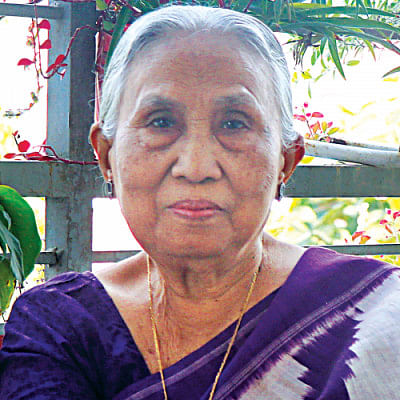
Manjulika Chakma - 2003
In the 1960s, when people in the hill tracts could not imagine starting a business – and, especially for a woman, it was absolutely unthinkable – an indigenous woman came forward to show how peoples' lives can be improved through business.
Her name is Manjulika Chakma – the first tribal woman entrepreneur in the country. Born in 1943 in Rangamati, Manjulika took bold initiatives to develop traditional looms in her area and establish the first business concern of tribal handloom products.
Traditionally, agriculture had been the main occupation in the hill tracts region dominated by tribal people. The art of weaving was taught to women as part of regular household chores. In her childhood, Manjulika learnt weaving from her mother Panchalata Khisha.
They had looms in their family, locally called "komortant." They used to produce traditional loom products in the 1950s.
Manjulika says during the 1950s and early 60s, many indigenous women in hill districts used to produce clothes for their own uses only. They never thought about starting any commercial venture. So, it was a real challenge for her to take such an initiative.
Manjulika joined Shah Boys High School as a teacher in 1961.
Around that time, she thought of doing something for her fellow weavers. She purchased two traditional looms in 1965 and started applying new weaving techniques while continuing her teaching profession.
Thus, her journey as an entrepreneur began with a capital of only Tk 500. It was a very difficult task, but she overcame all hurdles through sheer hard work and dedication.
Sometimes she had to stop production because of inadequate capital and raw materials.
Marketing was another problem she faced at the initial stages as there were very few buyers in Rangamati at that time. People outside the hill tracts hardly knew about the products. But she didn't lose heart.
Opening a very small showroom at her residence in 1965, she started selling her products.
Over time, she succeeded in attracting buyers and received huge appreciation while handloom products became a profitable business.
This encouraged her to concentrate on her business full time. Eventually, Manjulika's Bain Textile became a popular name in handloom.
Presently, Bain Textile has three showrooms in Rangamati and one in Cox's Bazaar.
Besides, her products including various clothing and household items are sold in selected outlets in Dhaka such as Aarong, Prabartana, Karika, Aranya, and Kumudini.
Products have been developed and diversified at Bain Textile considering the tastes and demands of buyers at home and abroad.
The company has a long range of products such as tribal dress (pinon, khadi), shawls, bed covers, shalwar kameezes, shirts, panjabis, T-shirts, frocks, sleeping gowns, skirt-tops, side bags, purses, sofa covers, napkins, and towels.
Bain Textile earned Tk 4 lakh in 2000 and Tk 6 lakh in 2001 from exports. Around 80 weavers, experts, and helpers are engaged in her handloom business, apart from the more than 100 tribal women in four villages who produce handloom products for sale.
With separate weaving, dyeing, design and tailoring units, and exclusive showrooms, Bain Textile emerged as a complete business house.
Manjulika still plays a key role in supervising the whole production process right from procuring raw materials like yarn and chemicals for dyeing, preparing them for use, and controlling the quality. She is a master in preparing vegetable dyes. It's a secret of her success in making her products popular.
In the early days of her business, Manjulika had fund constraints but banks could not do much for her as it was very difficult for them to provide loan to a person without collateral. Manjulika did not have any assets to keep as mortgage against bank loans.
Two local banks came up with proposals to give her loans but she could not make a deal with them.
Manjulika says a lot of changes have taken place in the techniques of producing handloom products but they have not lost their basic characteristics.
Traditional tribal looms have been transformed into modern ones but the products are still attractive because of their unique colour and designs that demonstrate the rich heritage of tribal community.
At a time when local and global markets are flooded with fabrics manufactured in modern and high-tech plants, tribal handloom with ethnic designs is still popular with a different taste and appeal. Manjulika played a leading role in popularising these indigenous designs amongst both local and foreign buyers.
Manjulika's bold initiative created new entrepreneurs also. Her tireless efforts encouraged others to start business of handloom products in the hill districts.
Over the years, about 20 to 25 such handloom enterprises have been set up and showrooms opened where several thousand indigenous women are working.
Thus, she has contributed towards employment generation for women in the previously almost unknown field of tribal traditional looms.
Bain Textile helped the indigenous people take part in economic activities and improve their lives.
Manjulika's work has also created a market for ethnic handloom products and brought them into the world of fashion. Her future plans include establishment of another unit equipped with power looms to increase production volume.
Manjulika's struggles did not come to an end although she is now a successful woman entrepreneur. She has been able to turn her very small initiative into a reputed business concern. But she could not yet open an outlet of her own in Dhaka due to lack of capital.
Manjulika won Shilu Abed Award in 2001 and Best Successful Woman Entrepreneur Award in 2002 in recognition of her outstanding contribution in the field of business and craftsmanship.
She participated in the International Industrial Fair in Kolkata in 2003 and 2004 and Chiang Mai Trade Fair in Thailand.
By taking part in these shows, Manjulika wants to popularise Bain Textile products abroad and increase export earnings.
She always feels that participating in a fair abroad is a good way of learning and also improving the quality of products.
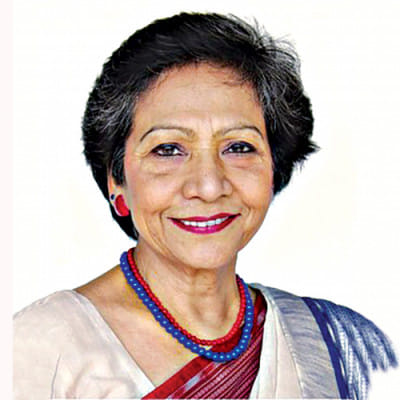
Geeteara Safiya - 2002
She is somebody who could have been a good columnist, a successful journalist, or, maybe a lecturer in a good university – but she wanted to try something different, Geeteara Safiya Chowdhury, chairman and managing director of Adcomm Limited, was born to be an entrepreneur – an extremely successful one.
Born in 1946, Geeteara completed her Honours and Masters in English from Dhaka University in 1967 and 1968.
After her marriage to Nazim Kamran Chowdhury in 1969, she moved to Karachi with her husband and joined "She Magazine" – a progressive magazine for women promoting women's rights and issues amongst other things – as a senior editor.
This was in no way an alien field for Geeteara who had enjoyed writing essays and stories since early childhood with her first story appearing in the "Young Observer" – children's page of the then Pakistan Observer – when she was in kindergarten.
Soon after, she had started writing in the children's pages of different newspapers and magazines like the Pakistan Observer, The Morning News, The Statesman (published from Calcutta), and others.
"My parents always told me that I would have to pursue a career and be economically independent. My father, AFM Safiyyullah, geared me towards journalism," says Geeteara, granddaughter of scholar Dr Muhammad Shahidullah.
While working at "She," Geeteara interviewed famous political leaders but felt restricted in her ability to express her views.
Disenchanted, she felt that she had no freedom of speech and it would not be possible to continue her profession in journalism.
During her tenure there, Geeteara also did some free-lance copywriting for a few advertising agencies.
When the magazine management decided to bring out a full East Pakistan issue, she travelled to Dhaka and met potential clients and agencies.
She was given a Tk 7,000 target which she easily surpassed by managing ads worth Tk 25,000. Once again when her husband was transferred back to Dhaka, she left her job at "She" and came back.
"While I was being picky and choosy in selecting a career track, I was offered a job in one of the leading advertising agencies Interspan, which is now known as Interspeed. I took that up.
Little did I know that within three months, I would climb up from being a copywriter to general manager to executive vice president. After two years at this agency, I left over a difference of opinion with my boss." Some clients who worked with Geeteara at Interspan encouraged her to start a new company.
With a lot of trepidation and excitement, she started Adcomm on July 4, 1974 with six people in a small room and an investment of Tk 10,000. But it was not an easy task.
She had to manage a bank guarantee worth Tk 50,000 for accreditation with the Sangbadpatra Parishad but she had only Tk 3,500. She rushed from bank to bank as they were asking for Tk 50,000 deposit or collateral.
She wanted to give her ornaments as collateral but the banks would not accept that. They were asking for a piece of land or property for this purpose.
"Finally, after arranging Tk 10,000 from family members, a managing director agreed to give me the bank guarantee on condition that the bills would be channelled through the bank," Geeteara recalls. Furthermore, there were fundamental problems with advertising.
"There were no big brands at that time. Agencies used to prepare occasional supplements on February 21, March 26, December 16, and do mostly public relation jobs."
In addition, apart from the two companies, Bata and Glaxo, which had pushed her to start a new venture, very few other companies were willing to work with a new firm where a woman was the CEO.
"When I sent company chiefs my business cards, they talked to me very politely but did not want to give me jobs. Despite these setbacks, Adcomm was able to add Fisons, British Oxygen to its client list," she adds.
In 1977, a multinational company asked advertising firms to submit designs for their products and, after scrutiny, selected six – incidentally, all six were from Adcomm.
"But the turning point for Adcomm was Fisons. It was more than a client and helped us grow. In fact, each and every brand of Fisons was special and helped the firm move a step forward," Geeteara admits.
Fisons and Lever were rivals in some categories so even though the latter was interested, it was not possible for Adcomm to provide services to Lever.
The conflict-of-interest issue came to an end when Lever took over Fisons Toiletries; "I was crying at the handing over ceremony. For me, it was like I nurtured a daughter who got married and is going to her husband's house and I am also with her," she recalls.
Lever then offered Adcomm the opportunity to work with its brands hence providing the second turning point for Adcomm. "Fisons helped us to learn creative works, how to grow and build our confidence but we learnt professionalism and marketing experiences from Lever."
From a small office, Adcomm expanded to become one of the most successful advertising firms of the country with the group's turnover amounting to about Tk 50 crore and generating employment of about 300. It is affiliated with renowned international agencies like Bates Worldwide, and Lowe, Lintas and Partners.
With expansion and diversification, she made her entrepreneurial journey more exciting.
Signage, the digital printing house, Screaming Girl, production house, Art of Noise, recording studio, and Marka, an ad firm, are all supportive hands for Adcomm to make it a complete house.
Apart from learning the trade, Geeteara also acquired a few early and crucial lessons on professional values.
"There is no shortcut to success. Values that are still the key to a successful career include punctuality, discipline, and commitment." In her business sphere, Geeteara never compromised on quality.
She worked hard, but at the same time, was honest in providing services to clients.
In her personal life, she mends her creative energy by growing roses, taking long walks, and caring for her cat, Benson.
"There is a lot more to be done. I want to build Adcomm to be recognised in the world as a world class advertising and communication solution provider. I love my work. It's my passion," she feels.
The brands Adcomm built – Peops Gel, Genisol, GMG Airlines, Agora, Wheel Patriotic – are her major achievements.
"In fact, the brands we built are like my babies," says Geeteara, mother of two children – son Farhan and daughter Keya.
She never ignored her family responsibilities – "I used to come home from work and help them with their homework."
From a very early age, her children started coming with her to the office, especially during their holidays.
A careerist, Geeteara is one of the leading women entrepreneurs of the country. She received "The Leading Women Entrepreneurs of the World Award" sponsored by IBM, Fortune Magazine, United Airlines, Dior, Chase Manhattan and managed by Star Group, a US-based company in 2000 for being one of the leading women entrepreneurs of the world.
In the same year, she also received the Priyadarshini Award from the Federation of Indian Women Entrepreneurs in Delhi.
Her success story is not only a matter of great pride for herself and her colleagues at Adcomm, but is also a source of inspiration for Bangladeshi women who intend to venture on their own.
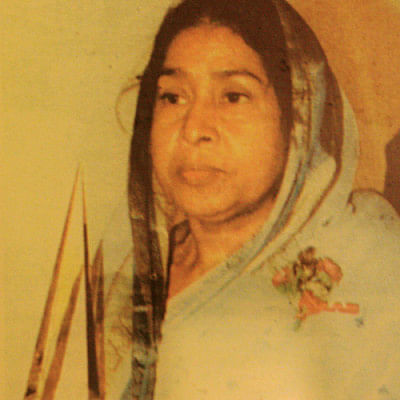
Rehana Kashem - 2001
A self-made entrepreneur, Rehana Kashem is among the very few successful women in the country who not only built her own enterprise but also has been able to attract her family members to help her to grow the company.
As a typical housewife, she loved to make handicrafts like cushion covers, napkins, tea-pot covers, table mats, and bedlinen in her spare time.
Her neighbours liked her work and often requested her to copy the designs for them.
Appreciation from others inspired Rehana to think a bit bigger.
She started her venture in 1983 with a capital of only Tk 6,000. Her sales ranged between Tk 5,000 and Tk 7,000 per month on an average at this stage. As demand for her products grew, she employed around 12 women.
The year 1990 was a milestone for Rehana. Because it was then that she expanded her area of work and gave her efforts a commercial face. Apart from retail selling from her house, she started to supply products to different popular boutiques in Dhaka. Saatrang's turnover soon rose to around Tk 30,000 per month.
The first contract she received was from the well-known shop "Bhushon" at Adel Plaza Lalmatia. Impressed by her works, the owner of Bhushon placed orders for punjabi. That was the beginning. Later, many shops in the city including "Bunon" got in touch with her. From household products, she moved to dresses.
By then, it was getting extremely difficult for Rehana to cope up with the rising demand. Her husband Md Abul Kashed Khan, an employee of a private company, always extended a helping hand to his wife. But now, he resigned from his job and devoted full time to run the business.
Khan took the responsibilities of maintaining accounts, procuring raw materials, and also helping Rehana in designs and business supervision. Rehana, who completed junior high school education, has a very supportive family that helps her with the numerous responsibilities of running a rapidly growing business.
Her two daughters-in-law, Shamima Khan and Najma Karim, helped her with designing and supervision. She also completed a training course on marketing in 1990 and a business management course in 1994 from the Bangladesh Small and Cottage Industries Corporation (BSCIC).
Another milestone for Saatrang came in 1993, when it started producing "three-piece" dresses for ladies and her sales multiplied shortly.
Rehana believes that sincerity, hard work, and business sense are some of the must have qualities for success in any endeavour in this age of tough competition. I keep my product prices reasonable and very much within the limit of the middle-class buyers," Rehana said.
"But plagiarism is so rampant these days and others often copy my products. That posed a new challenge and we have to work hard for newer designs and quality products."
She feels that keeping prices within her target group and producing quality products for them were the main reasons for which she did not face much competition from others.
Rehana also took part in local fairs and meenabazars just to promote Saatrang. She participated in a fair at Shaheen School in 1992.
"My products were so popular that I sold apparels worth Tk 60,000 on a single day," she recalled.
She contacted Micro Industries Development Assistance and Services (MIDAS) and after evaluating her business, the organisation granted her Tk 2 lakh loan without collateral.
Thanks to the loan, Rehana increased the number of sewing machines from 18 to 37. The amount of loan without collateral now rose to Tk 5 lakh. She did not face any problem in repaying her loan to MIDAS and is quite confident that if she applies for a bigger loan next time, she will not be refused.
The number of workers in Rehana's Dhaka factory is now around 50.
There are four sections in the factory that includes embroidery, tailoring, block print, and dye.
Basically, Saatrang specialises in all types of contemporary fashion trends like block print, tie and dye, applique, and both hand and machine embroidery.
Retail selling from her house is still continuing and Rehana's major production goes to some 20 wholesale buyers in Dhaka, Chattogram, Sylhet, Rangpur, and Moulvibazar. Rehana feels there are lots of scopes to expand her business and she has many things to do.
"In the early days, I used to produce different dresses and other handicraft items and most of them had good demand in the market. But things are changing very rapidly.
People have become more fashion conscious. Now I produce different items keeping in mind buyers' demand."
Besides retailing and wholesale from her house-cum-factory at Adabar, Shaymoli, Rehana is one of the leading sellers of MIDAS Mini Mart at Dhanmondi and Bailey Road in the city.
"There is always a very good demand for my products," she said.
"A major part of my buyers includes foreigners and Bangladeshis living abroad are also in the list of my buyers."
She started producing handmade quilt last year. "I think handmade products always have very good demand in the market," she added.
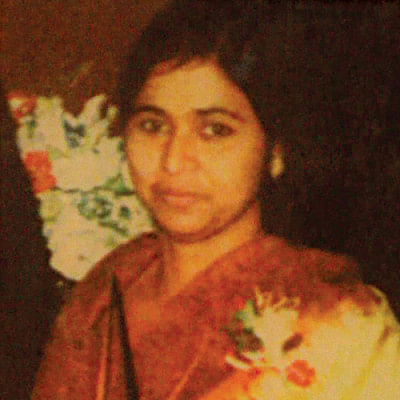
Salina Akhter - 2000
Salina Akther represents the indefatigable spirit of an entrepreneur. Defying all types of family engagements a woman can have, she runs a profitable organisation which supplies high-quality handicrafts to different brand shops in the city.
Business is surely in her blood. When Salina Akther was a student of class seven in 1980, she first dreamt of becoming an entrepreneur.
She started a poultry farm at her residence in Dhaka. It was a very small endeavour, totally insignificant no doubt with only four chicks in a cage.
But Salina had a big dream and with her relentless effort and hard work, she managed to succeed in flourishing her business into a 1,500-chick poultry farm by 1992.
But then she was faced with a number of family difficulties. Her father died, her child was going to school, and she had to give more time to the family.
It became quite difficult for her to manage medicines, food, and also market for the eggs. On top of everything, her college exams were knocking on the door. So, with a heavy heart, Salina had to liquidate her business.
The next three years, she was busy with her studies.
After completing her education, she started thinking of doing something productive, that at the same time would give her the scope to earn her livelihood and benefit the society.
Salina started her entrepreneurship afresh after going through a training course at MIDAS.
Under partnership with another lady, she started handicraft business in 1995 with some financial assistance from her uncle.
Salina opted for starting handicraft business as she thought this is one of the areas where she could apply her creativity and innovative ideas. Today, she makes a good business, supplying products to different renowned boutiques in the country.
As her uncle's money proved too little to make a big push, Salina applied for financial assistance from MIDAS and received a Tk 1,50,000 loan for her venture Aakor, which she has already paid back.
Now she has applied for another loan from MIDAS and is also planning to take a loan from Karmasangsthan Bank to expand her business. Now her own capital has reached Tk 10,00,000.
Aakor produces quilt cushion cover curtain, bed cover and sheets, saree, dress, and punjabi.
The company's total sales in 2000 was Tk 15,00,000, which is Tk 4,00,000 up from the 1999 sales-figure

 For all latest news, follow The Daily Star's Google News channel.
For all latest news, follow The Daily Star's Google News channel. 



Comments